After years of helping tell stories about heroes and villains–both as Star Trek: Deep Space Nine’s favorite Bajoran dabo girl, Leeta, and in numerous other film, TV, and audio projects–Chase Masterson went on her own hero’s journey. As detailed in her heartfelt TEDx presentation, Masterson suffered incidents of bullying and harassment that derailed her life. But from that low point came a new initiative, and a way to help others, especially children, embrace the superheroes within themselves.
The Pop Culture Hero Coalition, a 501(c)(3) nonprofit organization established in 2013 by Masterson and writer Carrie Goldman, uses stories from TV, comics, and film to both prevent bullying and bolster mental and emotional health.
“We are literally teaching IDIC—teaching kids to stand up for themselves and for each other,” Masterson says. “This work is what Gene Roddenberry started. In the very first episode, Spock made a risky choice to stand up for Pike because he knew that Pike was not able to stand up for himself. And so by using his own voice, he created a situation where Pike was able to live his best life. Spock put himself in jeopardy. But he did that because it was the right thing to do. These concepts are at the heart of Roddenberry’s work, and it’s wonderful to be able to put these concepts of IDIC and heroism to work in the real world.”
In 2021, Pop Culture Hero Coalition was named as the YMCA’s official mental health program, giving them the opportunity to bring their Heroic Journey Curriculum to thousands of children nationwide.
TrekMovie recently spoke to Chase Masterson about the Coalition, and how mental health has been depicted in Star Trek. Along the way, we also found out where Leeta and Rom might have ended up in the 20+ years since we last saw them.
Please tell us a little bit about the Coalition’s new partnership.
I am thrilled and honored to say that Pop Culture Hero Coalition’s Heroic Journey is the program for children, teens, and parents’ mental health at YMCAs nationwide. We were hoping to make a difference for people during the pandemic, so we created a set of tools on our website—The Heroic Journey at Home—to help children, teens, and parents learn resilience, how to manage family conflict, and how to manage difficult emotions during the pandemic, including grief. YMCA saw that and asked if they could put it out to their membership, and then a few months later they said “could we adapt your entire curriculum for our membership?” So they hired our team of educators and psychologists to do that, and this incredible Partnership was created.
How has the Coalition evolved since its inception?
Award-winning author Carrie Goldman and I founded this organization in 2013 to be the first ever outreach against bullying, racism, misogyny, LGBTQI+ bullying, and cyberbullying at a Comic-Con. We began working with psychologists who are pop culture fluent, so they use these stories that we love, including stories from Star Trek, to teach children, teens, and adults inclusion, allyship, and how to end bullying, and to teach the concepts that Gene Roddenberry laid down 55 years ago. And it was very exciting for me to be able to bring this full circle; as an actress, I have seen how deeply this show impacts people—and it has been so powerful to then work with psychologists and educators to make these stories part of school curriculum, and to really get to the root of why bullying happens, how to deal with the bullies, how to help them get psychological assistance so that they don’t feel the need to be cruel. We began soon realized that identity, and fear, and lack of self-compassion, lack of self-worth, and lack of resilience were so intrinsically tied with bullying that we should create a full mental health curriculum rather than just do bullying prevention. So we expanded the work, and under Carrie as Curriculum Director, our team created a 32 lesson plan program which has been in a limited number of schools since 2019 — and pending funding, we are hoping to expand that and powerfully get this work for IDIC out to more schools in 2022.
There were major crises with children and teens even before the pandemic, but now it’s at an all-time high, so this work is crucial. These children are going to be running the future, so we need to teach them empathy and other key skills – for themselves and for us. Can you imagine what the world will be like when we actually, widely teach Roddenberry’s concepts to kids?
And you have outreach and assistance available through the website as well, right?
Yes, there are free tools – made possible by donations – through our website, popculturehero.org. It’s called the Heroic Journey at Home and it basically teaches people how to be heroes for themselves and each other – how to understand and manage our emotions, resolve conflict peacefully, and give ourselves and others compassion and understanding for everything that we’re going through. And how to not take things personally when family issues or other conflict arises. There are skills and tools that can help us get through life — and these things are hugely important and yet so few organizations teach. And with fans’ support, we’re excited to be able to teach them.
There are a lot of characters in Discovery who have gone on their own emotional and mental health journeys through the series, whether it’s Dettmer’s struggles with PTSD, or Book’s experiences in the current season. How do you view the way these issues are depicted?
In the true destigmatization of “mental health” as a term, I would say that more issues than we realize are based in mental health. Take, for instance, Georgiou. People like her are monstrous because they have been hurt, and are angry and afraid. That is a mental health issue – her pain, her fear. Even though oppressors seem to be confident, it really is fear that makes people power-hungry and lash out in cruelty. Hurt people hurt people—and healed people heal people. Not knowing how to work and play well with others is based in mental health issues. So much of human behavior is based on how we feel about ourselves and our place in the world. And that goes for everything from conflicts at home, to asking for a raise at work, to how we vote. How we allow ourselves to be treated, and how we treat others and ourselves is key. Mentally healthy don’t bully each other—or ourselves. And we uphold each others’ human rights.
Speaking of the way we see ourselves, I think the issue of identity has become a much bigger focus over the past year or two, and characters like Adira really reflect that.
Adira is such a wonderful example of someone who has been evolving. At one point they wanted to be called she/her and now they are they/them. So here is a great example of how we don’t necessarily need to know and stick with everything about ourselves. We’re allowed to change. To grow. And we need to allow ourselves the room to do that, and we need to allow that in others. I love Adira’s journey. I love the relationship with Gray—so much warmth. And I love that people are seeing nonbinary and transgender characters connect with such intense love. I think that can only create more compassion, and understanding, and inclusion in the world – as it should be.
I think it’s part of what Roddenberry would be doing if he were writing the show himself. And I want to say that if you are in a group which is not specifically addressed when we speak of inclusion, if you are feeling left out of the conversation about inclusion because you’re not a person who is BIPOC or LGBTQ+, that doesn’t mean you’re left out of the conversation. No one is trying to replace you. No one is trying to take your seat at the table. Inclusion means we all get a seat at the table, and let’s face facts – the world hasn’t always been that way. So it’s wonderful that the world is catching up to Star Trek. But it’s the ultimate irony that some fans don’t see that, that some fans have actually spoken against having a black lead on Discovery or a female Doctor Who or people of color as main characters in Star Wars. It’s mindboggling to me because science fiction is about creating a better future for all of us.
Apparently, “Deep Space Nine” was trending on Twitter the other day. Why do you think the show still resonates with people?
Deep Space Nine was a groundbreaking show for so many reasons. We all know that it was one of the first serialized shows on television, and Michael Piller and Ira Behr had such vision and commitment to that because they trusted the audience. They trusted that you guys would tune in week after week, because this wasn’t the kind of show where you could miss a week or two and come right back in. These are storylines that had to be closely paid attention to. It’s wonderful that the writers had that kind of faith and confidence in the audience—but even deeper than that groundbreaking element was that we boldly went, but not to different planets or galaxies. We went boldly into our relationships and into our own psyches and into the elements of both peace and conflict that create who humanity is. It went boldly into the concepts of war, and the fear and cruelty that drives it, and what it means to stand up and do what’s right even when it costs us.
As Kirk said, “Risk is our business.” It went deeply into all of the underlying reasons that humanity as a species will ultimately either live or die, and into the reasons that so many people either live or die even today. Because we stand together as one or we fight against each other. And that brings us back to how important these skills are, and how important it is to learn how to communicate, how crucial it is that we teach nonviolent conflict resolution. Because violence can be physical, but it can also be psychological. Or financial. Society treats many workers so inequitably; that’s a type of psychological violence that people in power inflict, which has physical ramifications for workers’ health and well-being.
On a somewhat lighter note, Star Trek: Picard shows a lot of characters 20 years on from when we last saw them. What do you think Rom and Leeta are doing 20 years later?
Rom and Leeta are busy at work, making a more equitable Feringar. They’re not taking down Latinum as a currency — they are making sure to have a free market and still treat each other equitably.
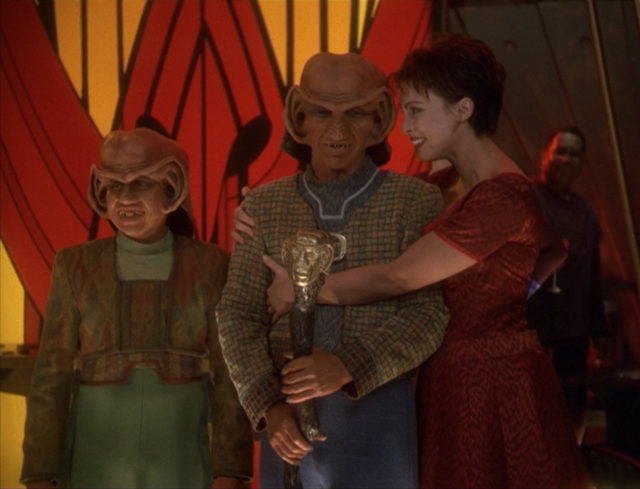
Chase Masterson in her final DS9 episode “The Dogs of War,” along with Aron Eisenberg’s Nog and Grodénchik’s Rom
How to help Pop Culture Hero Coalition
According to Chase, “Your tax-deductible donation is the reason we’re able to continue this work, because schools and community centers are underfunded. This work is saving lives, and your donations go straight to our programs. Join us in creating a world where we can all live long and prosper.” She also offers a number of suggestions for ways fans can help…
- Do a birthday fundraiser on Facebook! These help our work immensely.
- Introduce your place of business to us — perhaps a corporation you work with is able to support. That would mean more than we can say.
- You can also purchase a Be Kind T shirt or other merchandise. “Be Kind,” is the simplest but most important message, and has been embraced by numerous celebrities, from the Star Trek crew to David Tennant and Jeff Goldblum and Lucy Lawless and many more. We’d love it if you join them.
- If you’re an educator, email us at info@PopCultureHero.org to get The Heroic Journey into your school or district.
- And finally, please follow us on Twitter, Facebook and Instagram!
For additional info or to support, visit www.PopCultureHero.org.
Find more interviews at TrekMovie.com.

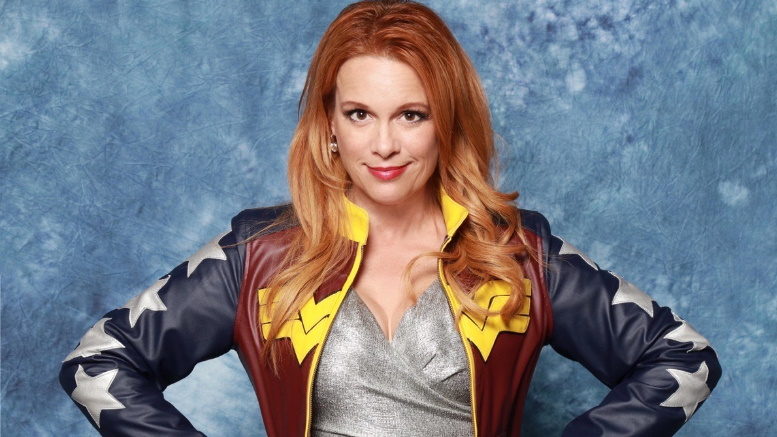
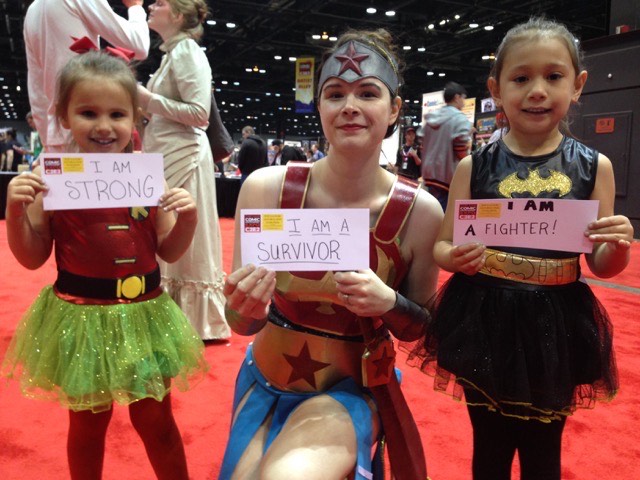

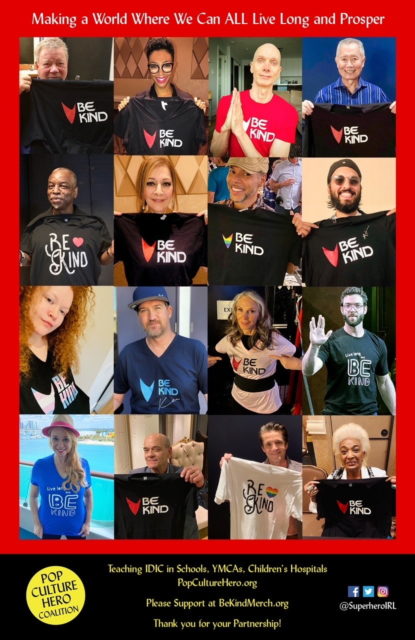


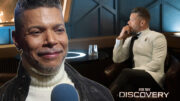
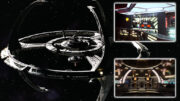
I applaud her efforts on behalf of mental health, but with due respect, trying to dismiss leaders like Emperor Georgiou (and by extension real-life figures Hitler or Stalin) as the by-product of mental illness completely ignores the myriad other scholarship.that political scientists have done on authoritarianism over the past 50-plus years.
There’s always a “levels.of analysis” debate to be had in international relations about these regimes: do we look at systemic variables (eg, the fact they were both large continental powers, desire for revenge after WWI, etc), domestic political factors, personal leadership, etc.
To put it in DISCO terms: had Empress Georgious not been bullied (was it ever stated that she was, in any case?), she likely still.woud have been emperor; after all, her prime counterpart was a high ranking Starfleet officer, or someone else.would have been.
This really strikes me as a Susan Sarandon level of Hollywood celebrity.analysis.
You make a good general point, although you lost me when you turned this into a sort of a political attack on the Hollywood left? Where you are correct is that some people are just dicks, a-holes, dictators and even mass murderers, and we should not write this off to the fact that they had a traumatic upbringing and are thus mentally ill, which causes them to do those things. I certainly believe that some people are just evil.
You are also right about Georgiou as well. It’s like tike a typical Roman emperor. They are raised according to certain value set that has them trained to be a ruler that commandeers an empire that is ruthless to its enemies, has slavery and commits numerous acts that we do not accept today in society. No bullying or mental illness excuses there (at least typically). Georgiou was a product of the imperial family way of life and upbringing that goes back many generations. Her actions should not surprise anyone, nor are they out of character for rulers of that empire. From her POV, that’s how you rule and expand the empire.
Georgiou knew no other way of life. How she got to the top was how EVERYONE got to the top. That said, there was empathy in the Mirror Universe, it was just not prized as it could get one killed.
I also don’t see her character as being analogous to someone who has a mental illness. I suppose one could make the case for institutionalized abuse as being why she was who she was, but as has been pointed out, Disco never tapped into the depth of her character at all. She was just reduced to a sarcastic dangerous shipmate who constantly lashed out at everyone and only grudgingly helped people until it was time to wrap up her storyline and quickly pretend she liked more people than Michael and had been thawing out and changing. They should have spent 2 years instead of 2 episodes making that happen, and her childhood backstory probably would have helped. The show’s stance was that she was a good person nurtured in the wrong way. The work done to get us to buy that was woeful. Waste of a great actress.
Good point. More backstory would have been great, and would have probably done a lot to silence the misinformed fans who constantly compare her to Hitler. That comparison makes no sense given that Georgiou’s environment was how every ruler would act to get to the top — she is a product of a preexisting environment that always creates that type of leader. Hitler, by contrast, created a reign of terror from what was a post WWI democracy in a western world with most countries having democracies and basic human rights…so that’s radically different and Hitler doesn’t have that institutional context of empire and mass murder — he created that evil environment himself. Hugh difference!
I mean, the only comparison to Hitler I could maybe entertain is the nature versus nurture idea that if Hitler had been accepted to the Vienna Academy of Fine Arts, he might not have been so inclined to get into politics. While just being in Vienna with its anti-Semitic mayor might still have been enough, people will probably never stop wondering if that one divergence would have been enough to thwart his path to power or even temper his beliefs.
Chase has always been cool.
But, this initiative is really special.
GOOD FOR HER!
As a secondary educator, I applaud Chase for her work tackling mental health and bullying in schools. Bravo!
#Wearestarfleet!
Brings to mind that classic Van Halen song! :)
Great cause, and she’s a great person — I have talked to her at a couple of conventions.
IDIC? Obviously a very important concept for charity, Masterson and the article.
Unfortunate that the article assumes the reader will know its meaning.
IDIC is the core philosophy of Star Trek. It’s pretty safe to assume most people who would be reading this website know what it is. And if they don’t, Google exists. So does Memory Alpha. IDIC has been mentioned on The Original Series, The Animated Series, The Next Generation, Deep Space Nine, Voyager, Enterprise, Discovery, and Picard, as well as in the movies. Heck, Spock has a wall-sized IDIC symbol on his wall in The Wrath of Khan. I can’t imagine a lot of people who would be drawn to a website called TrekMovie who would be saying “Huh? What’s IDIC? Never heard of it.”
I know it’s not the point, and this seems like a fantastic initiative, and this is probably bullying, but minor, pendantic quibble: Spock doesn’t sacrifice himself for Pike in the very first episode (that’s a little later on,).
But he does. And it’s a good lesson.